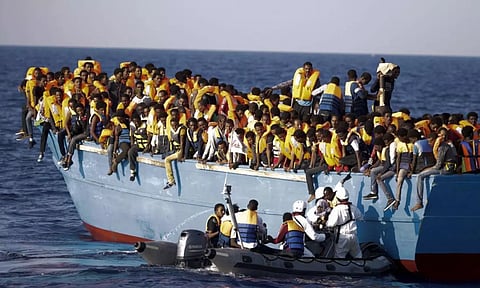

• KERSTEN KNIPP
LIBYA: After years of strife and war, Libya once again appears to be seeking a political breakthrough. According to the local newspaper Libya Observer, several high-ranking Libyan politicians met in Cairo last weekend for talks on a unity government and elections.
The meeting, which was organized by the Arab League, was attended by the President of the Libyan Presidential Council, Mohamed Yunus al-Menfi, who also serves as the country’s president. Other participants were the Chairman of the High Council of State, Mohammed Takala, and Aguila Saleh, the influential speaker of the House of Representatives in Benghazi, which is considered as counterpart to the internationally recognized government in Tripoli. On Sunday, al-Menfi optimistically spoke of a “very important beginning.”
The group called on the international community and the UN Support Mission in Libya for support. The Egyptian Foreign Ministry praised the shared intention to hold presidential and parliamentary elections. Observers, however, point out that these steps are only declarations of intent so far.
“I am skeptical about the chances of real success,” Salam Said, the head of the Libya office of the German Friedrich Ebert Foundation in neighboring Tunisia, told DW.
“Even the unity government formed in 2021 was not strong enough to organize elections that were already scheduled,” she said, adding that she doesn’t see a fundamental difference this time around. In her view, the representatives of the state and the two parliaments are certainly interested in a unity government — in theory.
“However, in practice they have no serious interest in presidential and parliamentary elections, as these could jeopardize their own positions,” she said. It is therefore telling that neither Libya’s incumbent President Abdul Hamid Dbeibah, nor his opponent, General Khalifa Hiftar, the strongman in the east of the country, attended the meeting in Cairo. “These two politicians in particular have no interest in a new government, as they would lose their offices and positions as a result,” Said added. She doubts that the joint declaration could be accepted by all actors in Libya. Nonetheless, there is considerable pressure on those responsible, Said continued.
“The population is deeply disappointed after their hopes for elections were dashed in late 2021,” she said. “The people feel that the political elite are constantly fighting for power while completely disregarding the interests of the citizens.”
Hager Ali, a Libya expert at the German think tank Institute for Global and Area Studies, takes a similar view. In addition to the disillusioned population, politicians are also under pressure due to the country’s security situation which was exacerbated by last year’s flood disaster.
“Southern Libya in particular is increasingly involved in the war in neighbouring Sudan,” she told DW, adding that General Hiftar’s militias transport weapons and equipment into the civil war country.
As an additional consequence of the war, the world’s largest displacement crisis in Sudan has developed with up to ten million internally displaced persons, Ali added. The Sudan crisis has been exacerbated further by the coups in Niger, Mali and Burkina Faso. The latest coup in Niger ended the cooperation with the EU, which makes refugee management in the entire region more difficult.